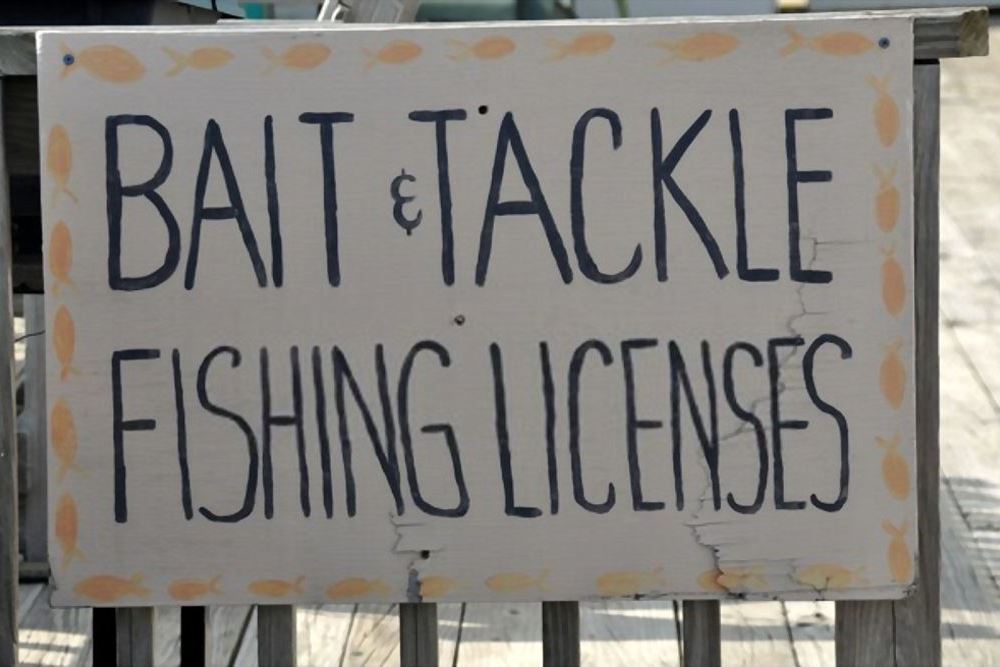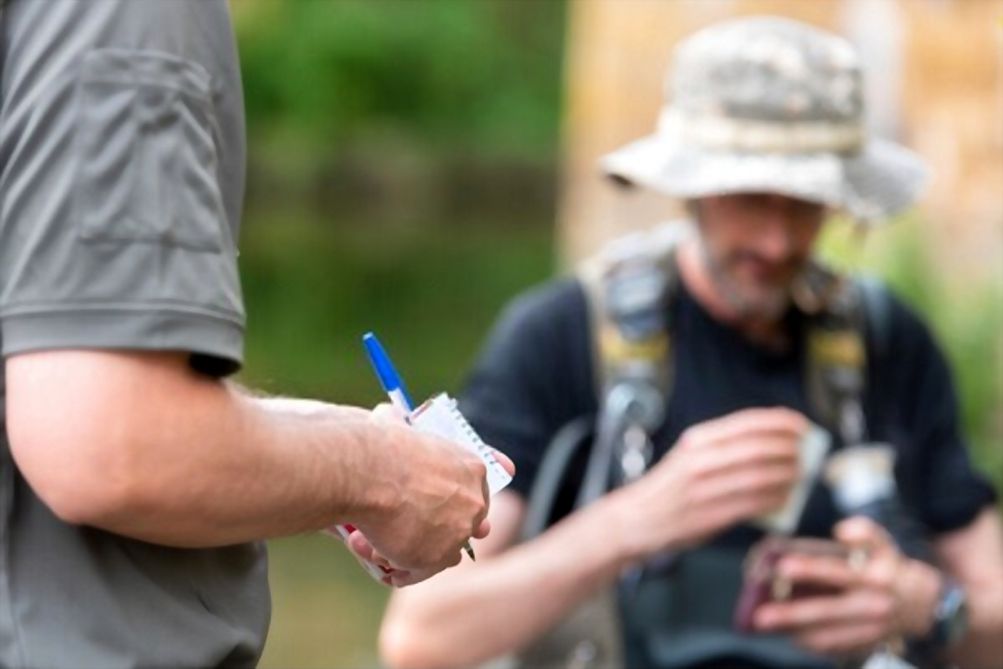Are you ready to go fishing?
Before you head out there, hold on just yet. Do you have all the prescribed requirements?
Some anglers are unaware of these rules, this is why we are here to address the question “What is the fine for fishing without a license?”
So keep reading and discover the documents you need to prepare before you go fishing to avoid penalties and fees.

What is the Fine for Fishing Without a License?
Fishing without a license is an illegal activity.
According to the Fish and Wildlife Conservation Act (FWCA) of 1997, anglers need to secure a permit prior to fishing. This involves fishing in freshwater or saltwater, regardless of the purpose of fishing.
Those who do not abide by this regulation will have to pay a fine, and the cost varies from one state to another.
It is worth noting that it is not considered a criminal offense in most states. In Florida, for instance, offenders are charged $50 for non-compliance to this rule. In addition to this fee, anglers will have to pay an extra fee of what it costs to get a license.
However, the fine gets doubled for second-time offenders who were caught fishing without a license within 36 months. In this case, you will pay $100 PLUS the amount of securing a fishing license.
The fine is usually under $50 for first-time offenders. For subsequent violations, it goes up to $100 but not over $500 in most cases.
In case you do have a license but you forgot to bring it with you when you were caught, you will only pay about $10 for court fees. The penalty is also different in other states, and you just need to be aware of what these are to spare yourself from troubles and massive expenses, in addition to inconveniences linked with court fees and so on.
This is why it is best to get your paperwork in order before you go fishing in this state or in any other state that imposes such a penalty.

What is the Purpose of a Fishing License and Why You Need to Get One
Anyone can choose to dive or take a dip in any body of water.
All you need to think about is your swimming skills and safety.
But this is not the same thing when it comes to fishing. If you want to snag a fish, you cannot simply show up at any river or lake and cast your line.
A fishing license is a requirement in most cases.
This serves as your legal permit to catch fish. It may be for leisure, sport, or business purpose, but no matter what your intention may be, you need to secure your fishing license before you start catching fish.
There are certain penalties involved in a non-compliance to this rule, so it is important that you have this permit before you get to your fishing spot. Otherwise, you are likely to suffer from steep fines when you are apprehended by environmental conservation officers.
And if you are thinking that perhaps they are usually not present at these fishing spots, think again…
These officers patrol bodies of water ALL THE TIME, and it is their duty to sanction individuals who fail to abide by this regulation.
Are There Different Types of Fishing Licenses?
Yes, there are.
A fishing license is not just one type, so you need to make sure you are in possession of the right one before you head out.
In fact, having just any fishing license is not a guarantee that you are in the clear. An incorrect fishing license involves penalties, which is why it is best to stay informed and know exactly what you need to do.
A freshwater license is not to be used when fishing in saltwater and vice-versa. If you plan on fishing on both types of water, you need to have both types of licenses to prevent any sanctions.

There is a combination license that applies to salt and freshwater. If you have this license, you can freely fish in the lake, river, sea, and so on without risking a fine.
But there is another thing you should know…
It is important to keep up-to-date with rules and regulations in each state. Some people are unaware of the fact that various states have their own set of rules, so they end up with a violation and penalties. Be sure to check with your state’s laws and ask questions relevant to fishing before you cast your line or net.
Types of Fishing License
Here are the common license types for fishing and what they are used for.
1. Saltwater License
This is a type of license anglers must obtain if they wish to fish in saltwater only.
2. Freshwater License
Freshwater anglers need to secure this license to fish in this type of body of water.
3. Combination License
If you are unsure whether you are heading to a freshwater or saltwater fishing spot, it is practical to secure a combination license. This allows you to legally harvest seaweed, shellfish, and seafood in both fresh and saltwater.
4. Razor Clam License
Are you keen on harvesting Razor Clams only? In this case, you must be able to present this type of license once an officer requests you to show your requirements.
5. 1 to 3-day combination license
For those who do not have any plans of making fishing a regular activity and they only want to do it short term, this is the license to get. It is only valid for the days stipulated in the license.
Do take note that these are the fishing licenses set by the Department of Fish and Wildlife in the state of Washington. If you belong in other states, you will need to inquire with the authorities involved or check their corresponding websites to obtain the correct license.
Additional License Types and Their Functions
There are two other license types for fishing.
One is the sports fishing license, which is only issued in a few regions.
With this license, an angler between 16 and 65 years of age can catch a limited fish species. There is a limit to the fish you are allowed to catch, so it is best to stick to the restrictions set in the license.
As for the conservation license, this is applicable for anglers who are interested in catching and releasing the species caught. It is also a great option if you are not a regular angler since it is cheaper than the sports license.
Can You Fish Without a License?
Now that you know more about the difference licenses and permits for fishing, here is another intriguing question people ask – is it possible to fish without a permit?
The answer is YES.
The law covers a specific age group, which means there are other individuals who can catch fish without having to present a permit.
People between 16 and 65 need to possess a fishing license. This is both for recreational or commercial purposes. If you are caught fishing without a permit, you need to pay a fine for not complying with the law.

But if you are a minor or over the age of 65, you may fish without a permit. Even fishing in your own farmhouse or one that belongs to your child or spouse is okay without a license (whether you are a minor, senior, or in-between).
Another thing to note is that military personnel can fish in their home county without any fishing permit. Just make it a point not to get close to any fish management locations since you will have to obtain permission in this case.
If you plan on catching fish, you also need to perform natural means such as using live bait. Unnatural procedures or techniques when catching fish without a license will lead you to severe sanctions with authorities.
This is why you need to keep abreast of the requirements in your location before you go fishing. State laws vary, so you have to have a clear understanding of what exactly is permitted and illegal when it comes to fishing in your state.
Perhaps you are thinking if you can simply use one fishing license for other states.
For instance, most states possess the same body of water. Maryland and Virginia are good examples.
But keep in mind that your Maryland fishing license is acceptable in Virginia. You do not need to secure a separate license from both states if you plan on fishing in these two locations.
This policy does not work in other states. They may belong in the same country but the rule states that a separate license is required before you can catch fish.
Guide to Obtaining a Fishing Permit
In this modern world, things have gotten much simpler and more efficient when it comes to applying for a fishing permit. It should take only a few days to get your preferred license no matter which state you may be in.
There are a number of options you can choose from for obtaining a license, and these are the following:
1. Via Phone
For those who need a fishing license, they may contact their state’s licensing department to request for this document. Simply make a phone call to the said office, and you will have to provide your payment details to settle the fees involved in applying for a license.
2. Online
As long as you have your device and internet connection, you may easily obtain a license by visiting your state’s official website for the fishing department. There are instructions stipulated on the website that you need to follow, so be sure to adhere to each one correctly.
You may settle the application fee via credit or debit card, and it is up to you to decide on the mode more applicable to your case.
Printing your fishing permit on their website may also be possible in some cases. Once you have provided the required details and paid the fee, you should be able to receive the permit immediately. Others may deliver the license to your doorstep upon request.
3. By Mail
For those who would rather do it the conventional way, obtaining your license by mail is a good way to go. This is a simple process but may take some time before you get your permit in your mailbox.
4. In Person
Lastly, you may simply visit your state’s licensing office. You should be able to find authorized agents who offer fishing permits to anglers interested in securing their license. Fishing equipment stores may also offer these licenses, so do keep an eye out for them.
When obtaining a fishing license, you only need to show your proof of identity and residency. These are essential requirements you should present to the local department office, along with your payment to receive the permit you need.
What You Need to Know Before Buying a Fishing License
You are now aware of what you need to do to get a license. There are also several ways for you to go about this process.
But it is also important to know the things to be aware of before you start securing your license.
For instance, you should think about your budget. Ask yourself how much you are willing to pay for the license. The types of licenses vary from one purpose to another, and the price changes, too.
This is why you should decide if it is indeed worth it to buy a combination license or just a license for either freshwater or saltwater. This should save you from unnecessary expenses in case you only prefer to fish in one type of body of water.